calsfoundation@cals.org
Riceland Foods
Riceland Foods, Inc., headquartered in Stuttgart (Arkansas County), is the world’s largest rice miller and rice marketer. It also operates one of the world’s largest rice mills, which is located in Jonesboro (Craighead County). Founded in 1921 as a farmers’ cooperative to market crops, Riceland is one of the top companies in Arkansas. It is the largest supplier of rice for the food industry in the United States, a major rice exporter to foreign countries, one of the nation’s largest grain storage companies, and is also one of the Mid-South’s largest soybean processors.
In the late nineteenth century, most of America’s rice was grown in Louisiana. Around 1900, William H. Fuller from Carlisle (Lonoke County) went to Louisiana on a hunting trip. He recognized that the conditions there for growing rice were similar to those in the Grand Prairie region of southern Arkansas, which at the time was used primarily for grazing cattle. Its hard-pan clay resting less than a foot atop the loam was well suited for irrigation and retention of the volume of water necessary for a good rice crop. After experimenting, Fuller produced his first successful Arkansas rice crop in 1904.
However, early rice farmers lacked a consistent market, being dependent on buyers from Texas or Louisiana who passed through Arkansas sporadically. In addition, the farmers had no way to store their crop for long periods in slack times until market conditions improved. In 1907, a group of farmers decided to improve their market situation, building the first Arkansas rice mill. Located in Stuttgart, it became known as the Stuttgart Rice Mill Co. and was followed in 1910 by a second mill built adjacent to it.
Crop prices fluctuated wildly during and after World War I, dropping from $3 a bushel to thirty cents a bushel during the same growing season in 1920. In January 1921, Arkansas rice producers met in Stuttgart to try to stabilize the situation. On September 23, 1921, they created a farmers’ cooperative. Calling themselves the Arkansas Rice Growers Cooperative Association, they decided to lease enough rice mills so their rice could be sold as a finished product. After some initial setbacks, the Stuttgart-based group reorganized in 1926 and then began steady growth.
With the availability of the modern combine and an artificial drying process, rice became a popular crop to grow in Arkansas. In 1944, the first local grain-drying co-op was organized, followed by locals formed in 1945 at Jonesboro, Lonoke (Lonoke County), and Wheatley (St. Francis County). More local drying co-ops were subsequently formed almost every year. In 1946, the cooperative started to package and advertise its products under the Riceland label.
A radical shift took place in 1954 when government acreage controls were imposed on rice farmers, who responded by planting more soybeans. In 1958, with a need for better soybean marketing, a sister organization to the Rice Growers Cooperative was formed. Named the Arkansas Grain Cooperative, it shared receiving, drying, and storage facilities for soybeans with the soybean processing plant located in Stuttgart. Recognizing this expansion of mission, the organizations were merged and the name Riceland Foods was adopted in 1970.
Riceland’s line of rice, soybeans, and wheat products is now distributed throughout the U.S. market, which since the late 1980s has seen a doubling in rice consumption alone. About three-quarters of Riceland’s products are sold in the United States.
In addition to its signature brands for home cooking, Riceland is also a major industrial supplier for companies such as Anheuser-Busch, General Mills, Gerber, and Kellogg’s, in addition to the food service industry nationwide. Riceland products are also exported to more than seventy-five foreign destinations, including Canada, Mexico, and nations in the Caribbean, Central and South America, Europe, Africa, and the Middle East.
Riceland’s business lines include grain storage and rice milling in addition to consumer products and food service industry products. Its product lines include rice, rice flours, rice oil, rice feed, bran and hulls, soybean meal, soybean oil, soft red winter wheat, and edible oils including corn, canola, peanut, and cottonseed. In the grain merchandising division, soybeans, rice, and wheat are sold as raw grains. Its feed products serve the livestock and poultry industries as well as catfish processors. The Riceland Research and Technical Center, which also houses a product development division, is operated in Stuttgart.
In 1996, Riceland purchased the world’s largest rice husk gasification to energy system from PRM Energy (PRME) Systems, Inc. The system converts rice husks to clean energy, enough electricity to supply thousands of homes. Riceland operates two PRME Gasification to Energy Systems, in Stuttgart and Jonesboro.
In 2009, the cooperative had almost 1,900 employees in addition to more than 9,000 farmers who are members in Arkansas, Louisiana, Mississippi, Missouri, and Texas. Arkansas is the top rice producer. Riceland utilizes rail, barges, and trucks, which fan out across Arkansas from their elevators, meeting ships for overseas transport at ports via the Mississippi River.
The cooperative is governed by a twenty-one-member board of directors composed of farmers who have been elected by Riceland’s membership. They represent Riceland’s twenty-one operational districts for three-year terms.
For additional information:
Carter, L. Clyde. “Oral History.” 1970. Audio online at Butler Center for Arkansas Studies, Arkansas Studies Institute (ASI) Research Portal: L. Clyde Carter Oral History (accessed April 6, 2022).
Mahon, J. C. “The History of Riceland Foods.” Craighead County Historical Quarterly 17 (Summer 1979): 10–17.
Riceland Foods. http://www.riceland.com (accessed April 6, 2022).
Nancy Hendricks
Arkansas State University
 Business, Commerce, and Industry
Business, Commerce, and Industry Des Arc (Prairie County)
Des Arc (Prairie County) William Hudson
William Hudson 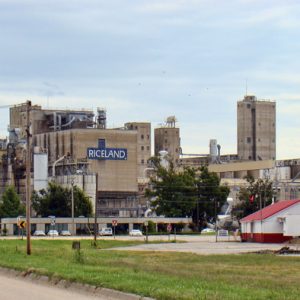 Riceland Foods Facility, Jonesboro
Riceland Foods Facility, Jonesboro 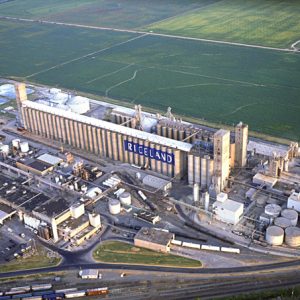 Riceland Foods Facility
Riceland Foods Facility 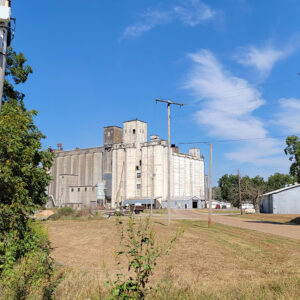 Riceland Silos
Riceland Silos 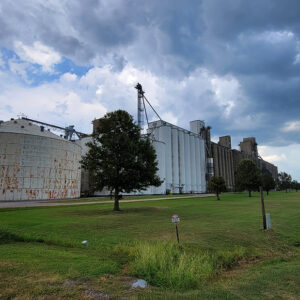 Riceland Storage
Riceland Storage 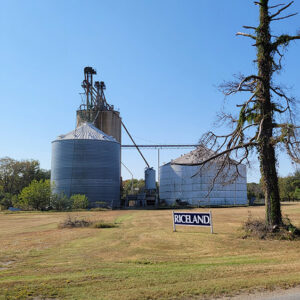 Riceland Storage Facility
Riceland Storage Facility  Jeffrey Tennant
Jeffrey Tennant 




Comments
No comments on this entry yet.